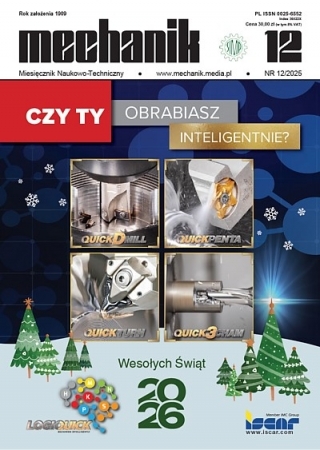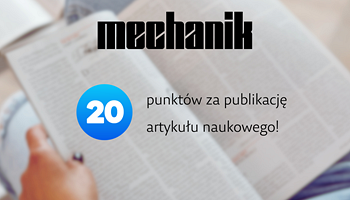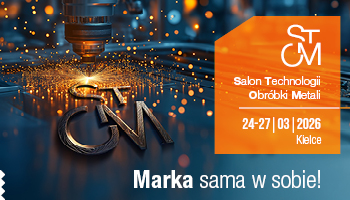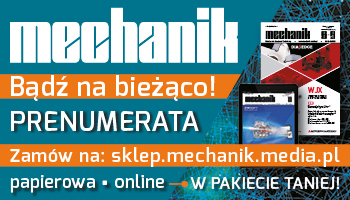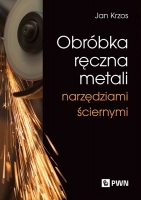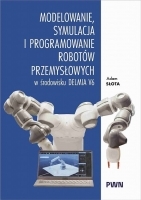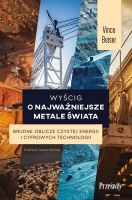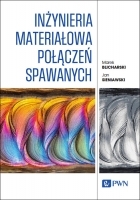Wpływ warunków chłodzenia na siłę skrawania podczas toczenia stali C45 *
Influence of the cooling conditions on the cutting force in turning of C45 steel
Mechanik nr 10/2016 - X Szkoła Obróbki Skrawaniem, XXXIX Naukowa Szkoła Obróbki Ściernej
STRESZCZENIE: W pracy zaprezentowano wyniki badań wpływu warunków chłodzenia na składowe siły skrawania podczas toczenia stali niestopowej C45. Rozpatrywano trzy sposoby chłodzenia: obróbkę na sucho, metodę MQCL oraz MQCL + EP/AW. Badania wykonano zarówno dla zmiennych parametrów skrawania, jak i dla zmiennych parametrów tworzenia mgły emulsyjnej. Zastosowanie metody MQCL + EP/AW pozwala zmniejszyć wartość siły skrawania w porównaniu do obróbki na sucho od 2,1% do 25%. W trakcie eksperymentu wykorzystano metodę parameter space investigation (PSI).
SŁOWA KLUCZOWE: siła skrawania, obróbka na sucho, MQCL, dodatek EP/AW, metoda PSI
ABSTRACT: The paper presents results of the influence of cooling conditions on the cutting force components during the turning of C45 steel. Three cooling methods were considered: dry cutting, MQCL method and MQCL + EP/AW. Experiments were performed for variable cutting parameters and for variable emulsion mist parameters. MQCL + EP/AW method reduces the cutting force compared to dry cutting from 2,1% to 25%. During the experiment Parameter Space Investigation (PSI) method was applied.
KEYWORDS: cutting force, dry cutting, MQCL, additives EP/AW, PSI method
BIBLIOGRAFIA / BIBLIOGRAPHY:
- Pusavec F., Kenda J., Kopac J. „The transition to a clean, dry, and energy efficient polishing process: an innovative upgrade of abrasive flow machining for simultaneous generation of micro-geometry and polishing in the tooling industry”. J. Clean. Prod. Vol. 76 (2014): pp. 180÷189.
- Sharma J., Sidhu B.S. „Investigation of effects of dry and near dry machining on AISI D2 steel using vegetable oil”. J. Clean. Prod. Vol. 66 (2014): pp. 619÷623.
- Malkin S., Guo C. „Thermal analysis of grinding”. CIRP Ann. Manuf. Tech. Vol. 56, No. 2 (2007): pp. 760÷782.
- Maruda R.W., Legutko S., Krolczyk G.M., Raos P. „Influence of cooling conditions on the machining process under MQCL and MQL conditions”. The. Vjesn. Vol. 22, No. 4 (2015): pp. 965÷970.
- Kaynak Y., Karaca H.E., Noebe R.D., Jawahir I.S. „The Effect of Active Phase of the Work Material on Machining Performance of a NiTi Shape Memory Alloy”. Metall. Mater. Trans. A. Vol. 46, No. 6 (2015): pp. 2625÷2636.
- Setti D., Sinha M.K., Ghosh S., Rao P.V. „Performance evaluation of Ti-6A1-4V grinding using chip formation, and coefficient of friction under the influence of nanofluids”. Int. J. Mach. Tools Manuf. Vol. 88 (2015): pp. 237÷248.
- Park K.H., Yang G.D., Suhaimi M.A., Lee D.Y., Kim T.G., Kim D.W., Lee S.W. „The effect of cryogenic cooling and minimum quantity lubrication on end milling of titanium alloy Ti-6Al-4V”. J. Mech. Sci. Technol. Vol. 29, No. 12 (2015): pp. 5121÷5126.
- Maruda R.W., Królczyk G.M., Feldshtein E., Pusavec F., Szydlowski M., Legutko S., Sobczak-Kupiec A. „A study on droplets sizes, their distribution and heat exchange for minimum quantity cooling lubrication (MQCL)”. Int. J. Mach. Tools Manuf. Vol. 100 (2016): pp. 81÷92.
- Statnikov R.B., Matusov J.B. „Multicriteria Analysis in Engineering”. Springer, 2002.





